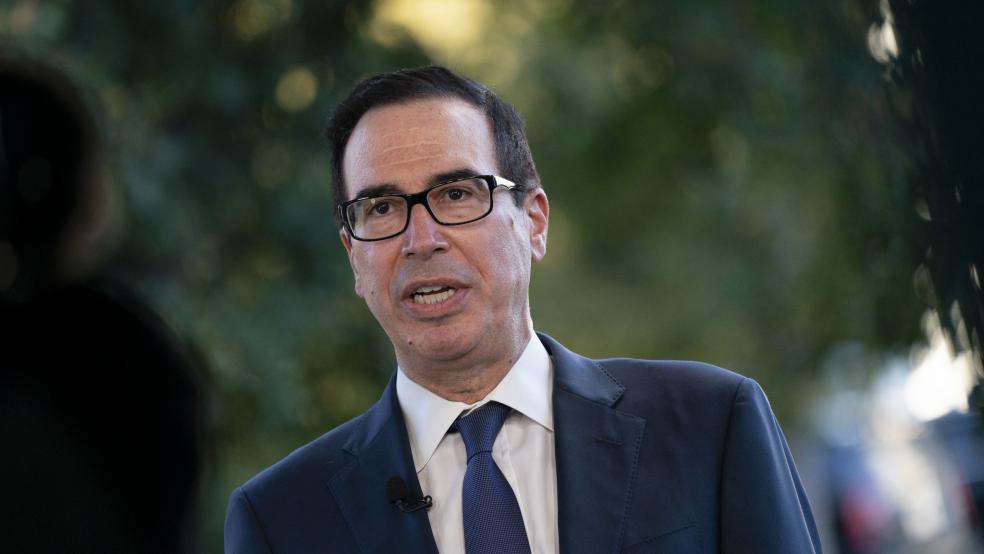In case it wasn’t already clear that a new coronavirus relief bill probably isn’t coming before the election, just take a look at what Treasury Secretary Steven Mnuchin, who has been negotiating the deal with House Speaker Nancy Pelosi (D-CA), said at the Milken Institute Global Conference Wednesday: “I’d say at this point getting something done before the election and executing on that would be difficult, just given where we are.”
Mnuchin on Friday offered Pelosi a $1.8 trillion package and the two spoke Wednesday morning for about an hour, according to Drew Hammill, a spokesperson for the speaker, who called the conversation “productive” but made clear the two sides still have significant differences.
“One major area of disagreement continues to be that the White House lacks an understanding of the need for a national strategic testing plan. The Speaker believes we must reopen our economy & schools safely & soon, & scientists agree we must have a strategic testing plan,” Hammill wrote on Twitter. “Staff will continue to exchange paper and the two principals will speak again tomorrow.”
Mnuchin also said that the two sides are making progress, but he reportedly criticized Pelosi’s insistence on a broad deal, again suggesting that they could quickly deliver more targeted aid, including to the airline industry, which has begun furloughing thousands of workers. “I don’t agree with the speaker’s approach of ‘we have to do all or nothing.’ We’re continuing to negotiate a comprehensive bill but we want to put money into the economy now,” Mnuchin said.
In a tense interview on CNN Tuesday evening, Pelosi pushed back emphatically when host Wolf Blitzer asked repeatedly why she wouldn’t accept Mnuchin’s latest offer, saying that Blitzer and others suggesting she accept the deal don’t know the details of the talks. “They are not negotiating this situation,” she said. “They have no idea of the particulars. They have no idea of what the language is here.”
When Blitzer asked why she would let the perfect be the enemy of the good, Pelosi said the administration’s offer was “not even close to the good.”
The election obstacle: Mnuchin said that pre-election politics may be lowering the odds of a deal. Asked whether Democrats are holding off on a deal now in hopes that they can more easily pass their own bill if they win the Senate — and because they don’t want to give President Trump a win he can tout to boost his re-election campaign — Mnuchin said: “That definitely is part of the reality. That’s definitely an issue.”
GOP political considerations are also hanging over the talks, as some Republicans distance themselves from a president they see trailing in the polls. A number of Senate Republicans reportedly pushed back strongly against the administration’s latest offer, and Majority Leader Mitch McConnell (R-KY) announced Tuesday that the Senate would vote on a narrower relief bill even as Trump has begun to publicly call for a larger package.
“Trump’s erratic moves on the stimulus in particular have flummoxed Republicans, who were already divided among themselves over how big a package they’d agree to,” Bloomberg’s Steven T. Dennis and Jordan Fabian write. “Many GOP lawmakers are keenly aware that Trump could pull the rug out from under them at any moment. They also are concerned he could be even more unpredictable on stimulus negotiations as the election draws nearer, according to a person familiar with conversations among lawmakers and their aides.”
Some Republicans are also looking ahead to the possibility that Joe Biden wins the presidency, Dennis and Fabian report:
“A GOP strategist who has been consulting with Senate campaigns said Republicans have been carefully laying the groundwork to restrain a Biden administration on federal spending and the budget deficit by talking up concerns about the price tag for another round of virus relief. The thinking, the strategist said, is that it would be very hard politically to agree on spending trillions more now and then in January suddenly embrace fiscal restraint.”
The bottom line: As Politico’s Sarah Ferris reports, “a dose of political realism has begun to settle in, with lawmakers and top aides begrudgingly acknowledging that it will be virtually impossible to clinch a multitrillion-dollar package in the 20 days before the election.”




